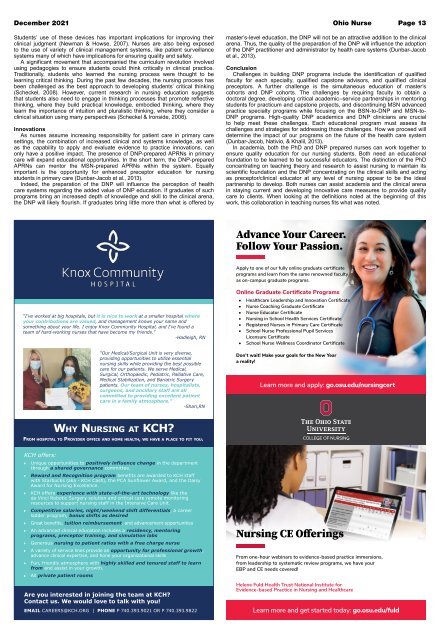Ohio Nurse December 2021
You also want an ePaper? Increase the reach of your titles
YUMPU automatically turns print PDFs into web optimized ePapers that Google loves.
<strong>December</strong> <strong>2021</strong> <strong>Ohio</strong> <strong>Nurse</strong> Page 13<br />
Students’ use of these devices has important implications for improving their<br />
clinical judgment (Newman & Howse, 2007). <strong>Nurse</strong>s are also being exposed<br />
to the use of variety of clinical management systems, like patient surveillance<br />
systems many of which have implications for ensuring quality and safety.<br />
A significant movement that accompanied the curriculum revolution involved<br />
using pedagogies to ensure students could think critically in clinical practice.<br />
Traditionally, students who learned the nursing process were thought to be<br />
learning critical thinking. During the past few decades, the nursing process has<br />
been challenged as the best approach to developing students’ critical thinking<br />
(Scheckel, 2008). However, current research in nursing education suggests<br />
that students also need to engage in thinking processes that promote reflective<br />
thinking, where they build practical knowledge, embodied thinking, where they<br />
learn the importance of intuition and pluralistic thinking, where they consider a<br />
clinical situation using many perspectives (Scheckel & Ironside, 2006).<br />
Innovations<br />
As nurses assume increasing responsibility for patient care in primary care<br />
settings, the combination of increased clinical and systems knowledge, as well<br />
as the capability to apply and evaluate evidence to practice innovations, can<br />
only have a positive impact. The presence of DNP-prepared APRNs in primary<br />
care will expand educational opportunities. In the short term, the DNP-prepared<br />
APRNs can mentor the MSN-prepared APRNs within the system. Equally<br />
important is the opportunity for enhanced preceptor education for nursing<br />
students in primary care (Dunbar-Jacob et al., 2013).<br />
Indeed, the preparation of the DNP will influence the perception of health<br />
care systems regarding the added value of DNP education. If graduates of such<br />
programs bring an increased depth of knowledge and skill to the clinical arena,<br />
the DNP will likely flourish. If graduates bring little more than what is offered by<br />
master’s-level education, the DNP will not be an attractive addition to the clinical<br />
arena. Thus, the quality of the preparation of the DNP will influence the adoption<br />
of the DNP practitioner and administrator by health care systems (Dunbar-Jacob<br />
et al., 2013).<br />
Conclusion<br />
Challenges in building DNP programs include the identification of qualified<br />
faculty for each specialty, qualified capstone advisors, and qualified clinical<br />
preceptors. A further challenge is the simultaneous education of master’s<br />
cohorts and DNP cohorts. The challenges by requiring faculty to obtain a<br />
doctoral degree, developing critical academic–service partnerships in mentoring<br />
students for practicum and capstone projects, and discontinuing MSN advanced<br />
practice specialty programs while focusing on the BSN-to-DNP and MSN-to-<br />
DNP programs. High-quality DNP academics and DNP clinicians are crucial<br />
to help meet these challenges. Each educational program must assess its<br />
challenges and strategies for addressing those challenges. How we proceed will<br />
determine the impact of our programs on the future of the health care system<br />
(Dunbar-Jacob, Nativio, & Khalil, 2013).<br />
In academia, both the PhD and DNP prepared nurses can work together to<br />
ensure quality education for our nursing students. Both need an educational<br />
foundation to be learned to be successful educators. The distinction of the PhD<br />
concentrating on teaching theory and research to assist nursing to maintain its<br />
scientific foundation and the DNP concentrating on the clinical skills and acting<br />
as preceptor/clinical educator at any level of nursing appear to be the ideal<br />
partnership to develop. Both nurses can assist academia and the clinical arena<br />
in staying current and developing innovative care measures to provide quality<br />
care to clients. When looking at the definitions noted at the beginning of this<br />
work, this collaboration in teaching nurses fits what was noted.

















